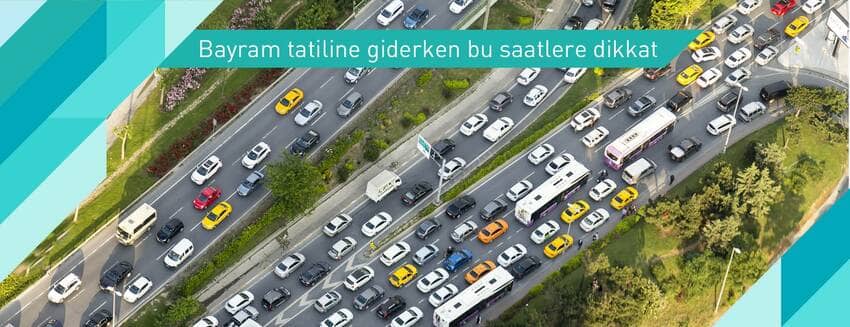
As Eid al-Adha is approaching, those who want to take advantage of the 9-day holiday are preparing to hit the road. Experts pointing out that the pressure to sleep between midnight and 06:00 in the morning is more, warn that "You should not set off between these hours". According to experts, it is necessary to sleep for no more than 20 minutes during break times and to avoid consuming carbohydrates that will increase blood sugar and bring sleep during breaks.
Üsküdar University NP Etiler Medical Center Psychiatry Specialist Asst. Assoc. Prof. Fatma Duygu Kaya Yertutanol said that sleep is critical for a healthy mind function.
Lack of sleep slows down brain functions
Yertutanol stated that the decrease in sleep duration or sleep quality means that the need for sleep cannot be met, that is, insomnia:
"Insomnia can be short-term (less than 3 months) or long-term (longer than 3 months). In any case, the mental functions of people with insomnia are negatively affected. People with insomnia feel tired, sleepy, anxious, restless and depressed. In addition, they experience attention deficit and their reaction time slows down, that is, they cannot react as fast as they want. Very important brain functions such as problem solving, memory, attention, focus and decision-making that enable daily life to continue are weakened. For all these reasons, people with insomnia are more likely to make mistakes in daily life and their decision-making functions are impaired. These people are significantly more likely to take risks and make wrong decisions than people without insomnia.
A quarter of accidents are caused by insomnia
Stating that research shows that about a quarter of motor vehicle accidents are related to insomnia, Assist. Assoc. Prof. Dr. Fatma Duygu Kaya Yertutanol said, "The brain of a person whose sleep needs are not fully met remains under a 'sleep pressure' to ensure the transition to sleep as soon as possible. As the time spent awake increases, this pressure to accelerate the transition to sleep also increases and the person's power to resist sleep decreases. Thus, the person falls asleep more easily. Although people think "I can stay awake" when they feel sleepy, sleep is a very strong biological drive. Therefore, sleep deprivation poses a great danger in situations where alertness is very critical, such as driving motor vehicles and using cutting and sharp instruments."
Sleep well the night before departure
Assist. Assoc. Prof. Dr. Fatma Duygu Kaya Yertutanol also listed the precautions that can be taken to avoid sleep deprived traffic as follows:
"If it is clear in advance that we will be traveling, especially on a long road, we can take some precautions in the process before we set off. Getting 6-8 hours of sleep the night before departure is the most valuable measure that minimizes the risk of accidents. Do not set off between midnight and 6 a.m. because sleep pressure is higher between these hours.
Should medication be taken?
It would be appropriate to skip the doses of regularly used sleep-inducing and distraction-inducing drugs the night before and the day of the trip after asking the doctor. On the other hand, medications that are not used regularly but are known to induce sleep, such as cold medications, should not be taken on the day of the trip. Alcohol should definitely not be consumed the night before and during the trip."
Stating that the ideal is to use a motor vehicle after meeting the person's need for sleep sufficiently, Yertutanol said, "However, in case of going out into traffic without sleep for any reason, some precautions can be taken to minimize the risk of accidents."
Pay attention to the symptoms of insomnia!
First of all, drivers should know that some situations are signs of "insomnia" and that they should take quick measures by understanding that danger signals are ringing, Assist. Assoc. Prof. Dr. Fatma Duygu Kaya Yertutanol listed these signs as follows:
"Frequent yawning,
Feeling of heaviness in the eyelids,
Blinking frequently,
Feeling tired and restless,
Going outside the road lines, failing to stay within the designated road lane,
Missing traffic signs,
Not remembering the last few minutes of the journey.
Rolling down the window or turning up the radio does not cure insomnia!
Drivers often try to induce sleep by rolling down the window, turning up the radio, etc., but this often doesn't work. So what can be done to stay awake?
Taking a short nap before setting off or during a break in the journey can help to restore alertness. This short nap should not exceed 20 minutes.
Consuming caffeine-containing beverages such as coffee during the journey or during breaks can be good for alertness, but caffeine will show its effect after about 30 minutes. Again, it is important to keep in mind that the effect of caffeine is short-lived. Therefore, drinking caffeinated beverages alone is not a precautionary measure.
Instead of traveling alone, it is useful to travel with someone who can be a substitute driver and change drivers every two hours to allow the other to rest."
How many breaks should be taken every hour?
Stating that drivers should take a break at least every 2 hours, Yertutanol said, "Drivers should spend their break times resting and sleeping for no more than 20 minutes if possible. Drinking a caffeinated drink first and sleeping for a short time until its effect starts helps the person to concentrate. If you are going to eat during the break, it is important to eat a light and small amount of food that is not heavy. Foods with high carbohydrate content that raise blood sugar rapidly will increase sleepiness, so it is necessary to stay away from such foods."
